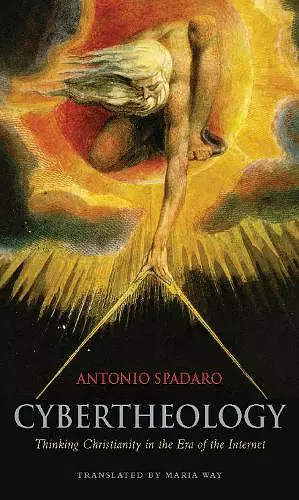Cybertheology
Thinking Christianity in the Era of the Internet
Antonio Spadaro author Maria Way translator
Format:Paperback
Publisher:Fordham University Press
Published:19th Sep '14
Currently unavailable, and unfortunately no date known when it will be back

How has Christianity and theology changed in the wake of the internet and mass communication? Tracing concepts in media studies, anthropology, and theology, Spadaro investigates this complex and enlightening topic.
How has the internet changed our notion of theology? Has the internet had similar effects on the thinking of Christianity that were experienced after the development of other media technologies? This book aims to clarify how thinking has changed or remained the same in an era which is often seen as one in which the media's changes have speeded up.
Because the Internet has changed and is changing the ways in which we think and act, it must also be changing the ways in which we think Christianity and its theology. Cybertheology is the first book to explore this process from a Catholic point of view. Drawing on the theoretical work of authors such as Marshall McLuhan, Peter Levy, and Teilhard de Chardin, it questions how technologies redefine not only the ways in which we do things but also our being and therefore the way we perceive reality, the world, others, and God. "Does the digital revolution affect faith in any sense?" Spadaro asks. His answer is an emphatic Yes. But how, then, are we to live well in the age of the Internet?
Spadaro delves deeply into various dimensions of the impact of the Net on the Church and its organization, on our understanding of revelation, grace, liturgy, the sacraments, and other classical theological themes. He rightly points out that the digital environment is not merely an external instrument that facilitates human communication or a purely virtual world, but part of the daily experience of many people, a new "anthropological space" that is reshaping the way we think, know, and express ourselves. Naturally, this calls for a new understanding of faith so that it makes sense to people who live and work in the digital media environment. In developing the notion of cybertheology, Spadaro seeks to propose an intelligence of faith (intellectus fidei) in the era of the Internet.
The book's chapters include reflections on man the decoder and the search engines of God, networked existence and the mystical body, hacker ethics and Christian vision, sacraments and "virtual presence," and the theological challenges of collective intelligence.
"The book provides a substantial introduction to the anthropological and theological questions raised by our life "on line": smartphones, Google, virtual spaces, avatars. Spadaro raises questions having to do with the need of the Church to engage the new 'intellectus fidei' in the age of the internet." -- -Massimo Faggioli University of St. Thomas "There are key questions in this book-whether or not one's congregational life is steeped in digital technologies. It is important that we consider the extent to which people's sense of the presence of others is being redefined by augmented reality." -The Expository Times "He [Spadaro] stirs our religious imagination to think differently about how we communicate faith in a digital culture." -St. Anthony Messenger "Cybertheology by Antonio Spadaro is an excellent attempt to understand Christian faith and theology in the era of the Internet and digital communication. It is a pioneering work that contributes to a new understanding of the familiar concept of theology as faith seeking understanding." -- -Jose Palakeel Theologicon, Kochi, India
ISBN: 9780823257003
Dimensions: unknown
Weight: unknown
160 pages